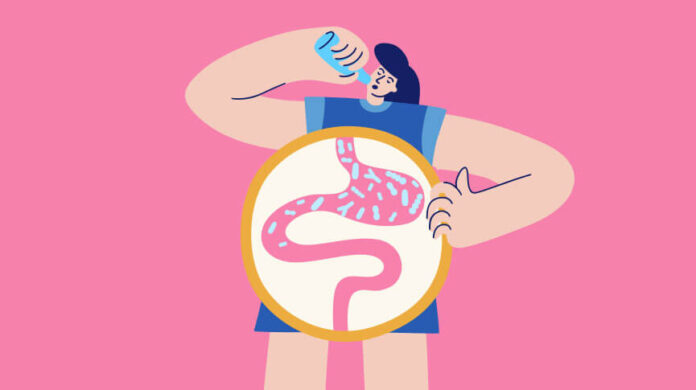Our stomachs are home to around a hundred trillion bacteria which work together to form our gut microbiome. The “good,” or “friendly” bacteria that reside in our guts are known as probiotics. These microorganisms are key to your digestive system, immune function, and nutrient absorption.
When women age and enter their 50s and go through menopause, the ensuing series of hormonal shifts alter their gut microbiome. This article discusses how to keep your gut microbiome healthy and the best types of probiotics for women over 50.
What Happens To Your Gut In Your 50s?
Although further studies are necessary, researchers are finding that female gut microbiomes change as they enter their 50s. One April 2022 review examining 10 studies on sex hormones, menopause, and gut bacteria showed a decrease in biodiversity in gut bacteria after menopause, though whether or not these changes are definitively good or bad remains to be seen.
In five of these studies, the scientists discovered a decrease in gut bacteria diversity in post-menopausal women or in women with estrogen levels comparable to post-menopausal women. Another three studies showed that post-menopausal women had gut microbiomes more similar to male gut microbiomes than women who hadn’t gone through menopause yet.
The levels of certain gut bacteria also changed; for example, post-menopausal, women tended to have higher levels of the Butyricimonas, Dorea, Prevotella, Sutterella, and Bacteroides strains and have lower levels of Ruminococcus and Firmicutes bacterium.
In another study analyzing data from over 1,000 women, studies found that the gut microbiomes of postmenopausal women housed high levels of bacteria linked to obesity and inflammation.
Tips To Choose The Right Probiotics For You
Remember: The best way to keep a healthy gut microbiome at any age is through a healthy diet rich in plant-based foods, an active lifestyle, and minimal alcohol consumption. However, if you’re headed into your fifties and looking for additional ways to bolster your gut health, here are some tips to keep in mind when choosing a probiotic:
- Which strain of bacteria you choose matters: Different probiotic strains offer different health benefits, so you should opt for the strain(s) clinically proven to have benefits for the specific symptoms and issues you are tareting.
- Targeted symptoms or conditions: You and your health care provider should evaluate the problem or symptoms you are trying to address for strain-specific health benefits. For example, Saccharomyces boulardii has been shown to assist with antibiotic and traveler’s-gut associated diarrhea, but may not be effective for vaginal health.
- CFU count: CFU count refers to “colony-forming units” that represent the amount of active, live bacterial cells the supplement contains. Remember – more CFUs aren’t always better. Consult with your healthcare provider to determine the dosage that works best for you.
- Refrigerated vs. shelf-stable: Be aware of how to properly store these live microorganisms so they don’t die and become useless. Always check the label and follow storage instructions.
Best Probiotic Strains For Older Women
Lactobacillus rhamnosus
The depletion of estrogen after menopause can sometimes cause the walls of your vaginal canal to thin and dry out, resulting in an increased likelihood of UTIs. Lactobacillus rhamnosus is a strain that has been shown to support vaginal health and boost your immune system.
Just like your gut microbiome, your vagina is also home to its own complex ecosystem of bacteria that need to be healthy in order to avoid infections. This strain of bacteria assists in maintaining an optimal balance of bacteria in the vaginal microbiome and reduces the likelihood of common infections like yeast infections and bacterial vaginosis. It also bolsters your immune response and helps your body fend off various pathogens.
Lactobacillus reuteri
This is another strain that supports urinary tract health. Lactobacillus reuteri prevents bad bacteria from adhering to your urinary tract walls, lowering the risk of developing urinary tract infections (which increase post-menopause). This strain also offers anti-inflammatory properties to balance out the increase in gut bacteria linked to inflammation that happens after menopause.
Bifidobacterium longum
Symptoms like bloating, constipation, and a slowing GI tract impacts all of us as we age and our systems slow down, but is particularly prevalent in post-menopausal women This strain is extremely effective for digestive health. Bifidobacterium longum regulates bowel movements and reduces diarrhea and constipation. It also supports nutrient absorption and makes sure your body is able to absorb the maximum amount of nutrients from the food you consume.
Bifidobacterium bifidum
Decreasing amounts of estrogen and progesterone can slow down the digestive process. When food takes longer to move through your GI tract, more water is absorbed, resulting in constipation. Bigidobacterium bifidum makes digestion more efficient by helping to break down complex carbohydrates, proteins, and fats. It also supports your immune system and helps your body fight against illnesses and infections.
Lactobacillus acidophilus
Another versatile strain that helps you maintain a healthy balance of gut bacteria post-50 is lactobacillus acidophilus. This strain helps inhibit the overgrowth of harmful bacteria and supports a healthy gut microbiome.

